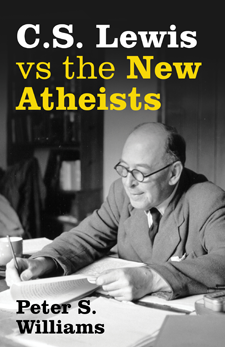 A review of CS Lewis vs the New Atheists by Peter S. Williams. Published in Australia by Paternoster.
A review of CS Lewis vs the New Atheists by Peter S. Williams. Published in Australia by Paternoster.
The New Atheism has something of a hate-hate relationship with C. S. Lewis.
In the contemporary atheist literature you do find expressions of admiration for individual Christians: for Martin Luther King (“but of course, it wasn’t his Christianity that drove his politics”), or for Pascal (“he was so clever—what a waste!”) or for Francis Collins (“One of the world’s great scientists—just goes to show that Christianity can happen to the best of us”).
However, when it comes to Lewis, New Atheists sing almost entirely from the same hymn-sheet of disdain. Not even a sense of loyalty to a member of their alma mater (Hitchens, Dawkins, Grayling, Dennett are all graduates of Oxford University like Lewis) has been enough to prevent them dismissing Lewis as a thinker of no great consequence whose arguments occasion no pause to the movement’s bellicose claims.
It is this dismissal of Lewis that Christian philosopher and apologist Peter S. Williams has sought to address in his latest book, C S Lewis vs the New Atheists (Paternoster, 2013).
The book works methodically and deliberately through the main arguments for God found in Lewis, demonstrating their validity as arguments and something of their power to address the intellectual challenges of contemporary atheism. After a fascinating first chapter on the nature of New Atheism and Lewis’ reception within it, Williams works through the main arguments in Lewis’ work: his epistemological arguments, the argument from desire, the argument from reason, the ‘problem’ of goodness and the argument from Jesus (Lewis’ famous trilemma).
In this way, Williams brings Lewis’ arguments together, parsing them out into their premises and conclusions, before setting them loose into the New Atheist playground.
The manner in which Williams distils and sets out Lewis’ arguments is both the strength and—in a way—the weakness of the book.
The strength of this approach is that it vindicates much of Lewis’ philosophical work from arguments unfairly levelled against it. By setting them out logic-book style, by and drawing attention to their pedigree in the analytic philosophical tradition, their validity and power is made more transparent.
My small gripe is that Williams is too successful in extracting Lewis’ arguments from what made them distinctively Lewis’. In coming to Lewis’ defence, he makes Lewis generic. We have Lewis’ thought, but without the faint smell of pipe-tobacco and English beer. We miss Lewis’s command of the language, his imagination and his appeal to our desires and will and emotions. We miss Lewis’ ability to sneak up on you and seize you with an idea, a suggestion, an insight. The fact that Lewis didn’t set out his work into formal logic, and that his arguments as presented sometimes skip crucial steps, has made him vulnerable to critique. This is a bug, but it’s also a feature. Those arguments—elliptical though they sometimes were—were also embedded in some of the most gorgeous prose of twentieth century literature.
A number of atheists who have come to faith in the current climate speak of being intellectually and aesthetically ‘snuck up on’—a Peter Hitchens being taken by a Rogier van der Weyden’s painting and the Book of Common Prayer, or Mary Karr’s experience of the liturgy in a Christian church service. If Lewis (or at least his vision for the apologetic task) has something to say to our engagement with contemporary atheism, it surely has something to say about the how as well as the what.
This is a good book. The extensive bibliographies and suggested resources at the end of each chapter make it something of a one-stop-shop for Christians looking for responses to atheist arguments, and it is a crash course in critical thinking. People who like their Lewis with pork pies and pipes will need to look elsewhere. But, for a clear and compelling case that Lewis’ arguments cannot be easily dismissed, Williams has served us all well.
Email This Story
Why not send this to a friend?



